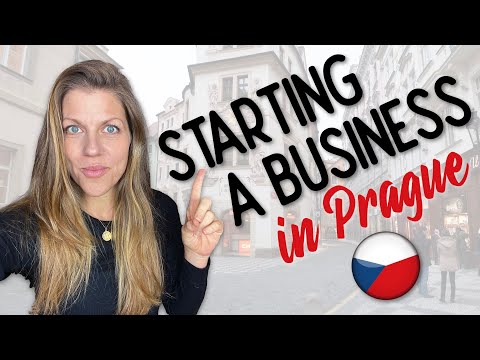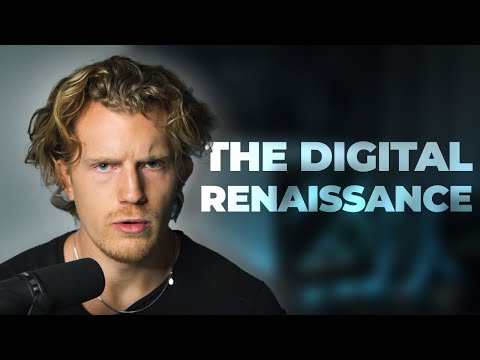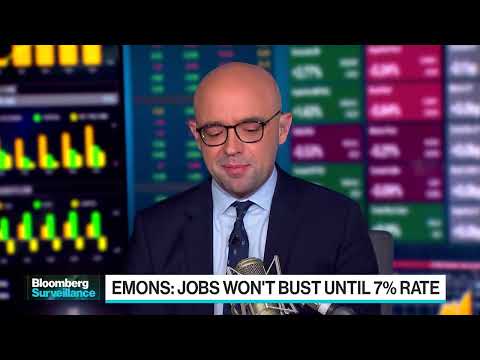STARTING A BUSINESS IN THE CZECH REPUBLIC — 5 Americans tell their experiences

Hi everyone, if you're new to my channel, I'm Jen, Expat living in Prague, Czech Republic. I'm a wife and a doggy mom, a Gemini and an entrepreneur. In fact, I'm the daughter of serial entrepreneurs. It's a hereditary disease. I've always had a side hustle going, and sometimes those side hustles have turned into full time gigs. So I have a special place in my heart for those people who see a hole in the market, take a risk and hang up a single, be it physical or digital.
Most people find it intimidating enough to start a business in their own country, but the people I'm going to introduce you to today left their home countries and moved to Prague and started businesses here. Vanessa is a stylist from Los Angeles who owns Paser, a women's clothing boutique that focuses on California influenced style. We carry brands from California, but also from around Europe, and we mostly focus on sustainable fashion, so clothes that are made from sustainable products do sustainable practices like manufacturing with really like people in mind so ethically. And it's something that I'm really passionate about and I wanted to bring to Prague as well.
Stephanie, from Washington, DC, runs an English language school and a membership program that helps English learners improve their speaking confidence daily. With studio English. We really do focus on the individual, and so there are a lot of learning gaps that people experience when they're in even an individual class in a corporate language school or in a different type of school.
There's a lot of gaps, and so we really focus on the individual and the specific things that that person means in order to feel confident. Chelsea and her husband, Giuseppe, own Ezra's bagels, a bagel shop and cafe where you can find some of the most authentic New York bagels this side of the Atlantic. And people are very passionate about bagels. I mean, I thought I was kind of on my own. I thought I was a crazy person who is obsessed with bagels. But everyone has a story. Everyone has some kind of attachment to them.
And then also just the nature of having a space like this, I think is important in people's lives. When I was a student, I spent all my time in a café. Chris is the owner of the Language House, a teaching English as a foreign language school that has been operating in Prague since 2004. The language house TEFL course, is designed to train people (for the most part) who have never taught English in their life. So we take people who are interested in teaching English as a language, and it's a four week course that's very intense.
In it we go over grammar and methodology. And most importantly, the students teach a lot of practice teaching that's observed. So by the end of the four weeks they come out, hopefully very well trained, pretty experienced teachers, and we help them find work in Prague or other parts all over the world, other places all over the world. But before we get to my conversations with these entrepreneurs, I want to thank this week's sponsor NordVPN.
Don't think you need a VPN on your computer, tablet or phone? Think again. Here are three reasons why you do. If you're using a website that doesn't have httpS, then that website is not secure and cybercriminals can access your internet traffic between you and that site. NordVPN helps keep that data private, even from your own internet service provider. How do you know if an app on your phone is secure? You don't. NordVPN adds an extra layer of security to your mobile phone to keep that data that you use with that app private.
Public Wi-Fi is not secure, and it's the perfect opportunity for hackers to access your internet traffic. NordVPN encrypts that traffic to protect you from cyber criminals trying to steal it. This month, NordVPN is offering a holiday season deal for viewers of Dream Prague. You can go to the link and the description box below to get a two year plan,
plus one additional month for free with a huge discount. So check out the link below to protect your devices and your data while also getting huge savings. When you do, you help me support this channel so I can keep making you more videos. So thank you.
One of the advantages of being a foreigner is that you can identify holes in the marketplace and you already know what works really well back in your home country. Ezra's bagels started out as simply that bagels. I used to order a week's worth of bagels and pick it up at their apartment up in Letna.
I asked Chelsea if she'd always had plans to open a bagel shop. God, no, absolutely not. It was actually Stephanie Cohen who said, "I want to buy those from you," and I said, "Why? You want to buy bagels from me?" And I thought it was a completely ludicrous.
And then, you know, she bought them and she's like, "These are really good." So Giuseppe said, "You know, maybe we can do this a little bit and help augment rent." We had just had Ezra, so obviously finances were not awesome. Pandemic was going on. I lost all my photoshoot jobs. I went from doing anywhere up to five photoshoots a week to zero. So that was a huge hit on our wallet.
So we're like, OK, yeah, we'll do a few. See how it goes. And it went...it went way further than we anticipated.
We thought we'd maybe have an order a week, but we were having five a day. You can take bread and make it into a circle and bake it. And it's not a bagel, right? And I think that's the instinct that people have who have a superficial familiarity. They see images of it, but they've not really tried them... Talk to these guys for a few minutes about bagels, and you will never mistake a bagel for any kind of bread you could find in a pekárna. They kind of have personality. I think bagels have a strong presence.
Prague is not short on language schools, but Stephanie identified a way to improve upon the old methodology used in those corporate schools. I recently started a new project which is called My English habit. One of the reasons that I started this project was because all of my students and really all of my students were saying that they never had enough time, so they had 60 Minutes once or twice a week. It was great. They had a great time. But it's not enough to make any real progress on their goals. And so what my English habit does is it encourages you to build better speaking habits five minutes a day.
You hit record on your phone. We give you all kinds of topics and things to talk about. And then you send it to the group and then the teachers, myself and some others give you specific feedback based on your audio transcript.
So literally line by line, word by word, pronunciation, syntax, vocabulary, all these things. You're getting all of this rich data, basically, so you know exactly what you need to focus on, and then you can prioritize what you want to focus on to have the highest impact for the time that you have throughout the week. Vanessa knew that if she craved the laid back California style that she grew up with, other people in Prague might be interested in it, too. I think a little bit was selfish in the sense that I was really missing all the brands that I shopped back home and kind of this more like laid back style where you're casual, you're comfortable, but you can still feel like confident when you go out. And I started to see some of that here.
Like, really, I really appreciate Prague and a lot of brands already that are here in stores that are really focusing on being like more sustainable and really seeking out those brands that I care about making a difference. So I kind of wanted to jump on that like while it's growing, I guess, in Prague. Sometimes it's not a product that fills a hole in the marketplace, but a particular American style of interacting with customers. I think what was really important to me was customer service. So I really want everybody that comes into the store to kind of feel like they're a guest in my home.
And, you know, when they come in, that's my whole focus is to make sure that if they're looking for something, I can help them find it. If they can't find it here, maybe I can give them suggestions somewhere else. But I just really want this to kind of be a place that people know that they can always feel welcomed.
Chris took his own experience at a TEFL school and improved upon it to create the Language House. He knew that teaching English was only part of the expat experience and that creating a real community at the Language House is what would set his school apart from other TEFL schools. And the course is obviously more than just teaching.
It's, you know, the support and the network. We help people find housing and make friends and kind of build a home, whether it's teaching or non-teaching related in the city and other places. I remember when I moved to Prague, you obviously make great friends that first year, but when I went into my second year, I realized that everyone left because I was kind of alone and I was like, OK, well, this isn't a good feeling. And part of the reason why so many people leave after six months or a year, or at least they did in the past, was that their whole support network goes away and they're kind of stuck as this strange expat ghost that haunts places where there's no longer people there that they know anymore, and it's all filled with new people. So I thought that the strength of the school and the experience was going to rely on building these specific relationships. It's true of some of my closest friends, and I met at the language house.
Vanessa and her Slovak husband, Lubo, met there, too. I've wondered if these guys were like me. Serial entrepreneurs that had new ideas at every turn and found it pretty impossible to sit still at a desk all day.
You know, it's funny you say that because I'm much more able to have a normal job. I think Giuseppe, on the other hand, would have a hard time in an office. I know he would have a hard time in the office because he had an office job once and it was miserable.
I worked for a clothing company back in LA and I was a store manager for about seven years and kind of have worked in fashion for around 10 years. I worked in television and the, you know, the networks that I worked for were office jobs most of the time, office and studio, and I was pretty OK with it. I mean, I'm from New York. It was like in my head that you're supposed to get a corporate
job and you're supposed to go to the office every day. And so I guess I had just kind of resigned myself to 'that's how you do things.' Well, I came as most people come here. I took a TEFL certification course at a school here and I was twenty-one. After that, I started teaching as an English teacher and then shortly, I mean, within a year or so, that was when we started developing the Language House as a TEFL course.
I have management experience like from my previous life. But it definitely wasn't management in regards to owning and operating a school of some kind. Yeah, I've always kind of like wanted to run my own business somehow, just like completely independently. And I think I really get that from my dad because he also had his own business. He had his own furniture manufacturer for thirty seven years. So I think I have like a lot of influence from him in that sense. So I asked them what was the biggest challenge they faced or are still facing trying to get their businesses off the ground? I mean, I think it's intimidating really anywhere you go, but especially being someplace where you don't speak the language.
You think it's a good idea, but do other people think it's a good idea? And just like the whole process of how to do it was super scary. But I think what was really helpful is that my husband, Lubo, is able to communicate with people here, and he really helped and kind of like answered all the questions that I wasn't able to answer. And in that sense, we kind of teamed up to create this together. Do think you could have done it without a Czech or Slovak—he's Slovak... Yeah Could you have done it without a Slovak partner? I could have, but it would have been much more expensive, probably. And I would have had to kind of like, create a bigger network of people I could trust and who I could rely on to help in the things that I wasn't able to do myself without being a native speaker.
The biggest, I mean, there's a lot of like grifters out there. And so you have to put your trust into people to make sure that your articles of incorporation are legit and that everything's fine. You're doing a lot of forms and a lot of other things. And so I worked with an American guy who helped me out, and he was recommended and it worked out well. So, yeah, but but it was definitely difficult.
It's definitely stressful. Here in my head, it was like, Well, I live in Europe. There's gonna be so many regulations. There's going to be so many health codes and
there's going to be so many like, you know, bits of red tape and bureaucracy that we have to overcome that maybe it just wouldn't be worth it. But once we started doing the research, when the space became available, I mean, we found that this is normal stuff, but not... it's not like...
I don't want to speak from a position of privilege and say anybody can move to Prague and open a business. But we found that the barriers were were less than we anticipated. Yeah, there's bureaucracy stuff that comes in. To open a cafe or a restaurant or a wine bar or what have you, you need either a culinary degree or you need someone who has a culinary degree to sign on as a sponsor.
And then you also have to have a doctor sign off that you're not going to spread any diseases. I think the hardest thing and sometimes still the hardest thing for me is to really like, put myself out there and advertise and so that, as like the manager running the studio is still difficult for me just because it's something that I getting better at it, but it doesn't come naturally to me. I am not a trained baker. In fact, we taught ourselves—we kind of started with the recipe wasn't exactly right. Tweaked it. It wasn't exactly right. Kept tweaking and tweaking.
I make the bagels every morning. So Giuseppe will often come down to give me a break and he'll come down and I'll meet him later in the day. Or maybe I'll take all of Tuesday off, but it is just the two of us. Yeah. Well, it's actually the three of them.
Chelsea and Giuseppe have a toddler named Ezra for whom the café is named. Ezra has a little playroom / nap room in the back. But most of the time you'll find him running around, bringing people— he likes to bring people, his cookie, his blanket. He likes to play with the people too, which some appreciate, and some less so. So we try to rein it in when and when it's not appropriate. When I caught up with Chris, he and his staff are opening the language house for the first time after 15 months of pandemic related closure.
I think now we're kind of in this normalcy pandemic mode where we're kind of used to having things, maybe lockdown or maybe you can't go here. And I think last year it felt really strange because I remember when the pandemic hit and we canceled our March course, we canceled it like three days before it started. I remember coming back home and thinking like: 'it might be....I mean, it could be like eight weeks where we don't have a course! I mean, the borders are closed, but I mean, for a few weeks, I'm guessing?' And you know, and I think...
So July, August, September 2020, I felt like things were weird, like starting would have been weird or at that point. Now, like once things happen and things moved, I mean, everything's kind of moving along pretty quickly now. I wonder all the time if I could run a successful YouTube channel back in the United States: 'California girl living in California'? No one to watch. So I ask these entrepreneurs if they thought they could run these businesses back in their hometowns.
That would be impossible. It would be it would not be a conversation that we'd be able to have. Mainly because of rent and upfront costs. We were able to do this at a very low upfront cost from a single investor, and you'd be surprised at how little we spent. The chairs I'm sitting in were free from Facebook Marketplace.
This table is from literally from our apartment. So, you know, those sort of things are obviously we'd be able to find things on Facebook Marketplace in New York, but the rent's impossible insurance, and it just wouldn't. It would never happen. Yeah. Yes, I could. But I think in Los Angeles,
there's a lot of competition in the sense that it's hard to find brands that not everybody carries already. And I think in Prague, in Europe, this style is pretty unique in the sense of it being like, laid back and 'California'. But I think, like in Los Angeles, it's like super saturated already with these kind of like styles and brands.
So I could do it. But it would it would be a lot more competitive. If I think about it right now. I literally cannot imagine starting a small business in the United States, not even just like paperwork and stuff like that, but just the process of having your own business. Work-life balance, having opportunities like, OK, I'm an English teacher. So obviously there's like a little bit of a difference there as well.
But even just the formalities of starting a business and having the security or like the like a fallback of like, 'OK, maybe this business isn't going to work out.' I know I would be destitute in the US if I put some, like as much effort and time that I've put into my two businesses and money. Yeah, definitely. And money too. Doing that in the US just seems impossible.
Like I would be, yeah, in a not great situation. I think So, when you're raised in the United States, part of the idea of the United States is, you know, it's free and it's pro-business, right? And you can start a business, you can make money, you can get rich, all of this. I think it's actually very difficult in the United States to start a business because there's a lot of competition, and it's one of the few things that you can do to try to get out of the rat race. So everybody kind of gives it a shot and it's great, but a lot of them don't stick. So is the gold rush over? Is it too late to start a business in Prague? I doubt it. I see new and interesting businesses opening all the time.
I think if you're if you plan on starting up a business, it's always good to have a Czech person who you trust and handles these things. We obviously work with the tax accounting company and obviously have a manager who's Czech. (Radka. Hey, what's up!) And and I think it's it's just so... even if you're Czech is pretty good, it's so easy to miss something small and a little proposition changes everything. Or having to make a call of someone really on the other end doesn't speak any English at all.
You never want to be in a position doing business where communication isn't 100 percent clear or else you run the risk of having problems. I mean, in my experience, you have to have an idea and you have to have the willpower to do it. Everything else kind of just falls into place. I know that sounds kind of "oh, OK, look, she has it so easy," but I mean, there's a lot of work involved, of course, but I think honestly, your creativity and your ideas...It's easier to have them appear in a tangible way, maybe in Europe generally, but definitely in the Czech Republic. And so for me, like if I'm comparing the Czech Republic in the US, like there's no way that I would be able to do any of that in the US.
And so, you know, we joke like, 'Oh, we're immigrants here in a different country to have a better life.' But like I am! Like, I have been able to start two businesses. That's crazy. Thank you to Vanessa. Chris, Stephanie, Chelsea and Giuseppe for taking the time to share your stories.
I'll leave links to all the businesses we spoke about today in the description box below. See you next week, bye! Bagels originated in Central Europe, in Poland in the 19th century and in Jewish communities in Poland. So, you know, maybe...a 150 or 250 miles from here are where bagels originated, and then Polish immigrants and other Jewish immigrants from Central Europe brought them to New York late 19th, early 20th century. And in those immigrant communities there, that was a way for them to feel like they were at home.
So we've kind of done this exact reverse of that situation where we have immigrants from America who come to our Central European Bagel shop because it reminds them of America. And there's literally like a 180. It's pretty interesting.
2021-12-10 07:15


